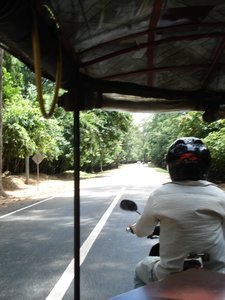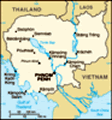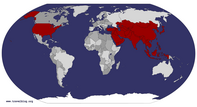Advertisement
Published: September 27th 2009

 Commission Train
Commission Train
Tuk-tuk from the Aranyaprathet bus station to the Cambodian border. When I took this photo, I was blissfully ignorant of the impending detour to the "immigration office."Journey
From my journal on September 9: "Going home in nine days. Actually, I'm leaving Bangkok in eight. I'm on the six hour bus ride from Siem Reap to Phnom Penh, growing steadily angrier at the bus driver's liberal use of the horn. On either side, Cambodian rice paddies, farms and villages stream by. Most of the wooden houses sit on stilts, raised maybe 3 to 6 feet off the ground. The reason, which eluded me earlier, has become obvious. In wet seasons the flat rice fields are flooded with water. This being September, the road, which is raised a few feet off the ground, is the only dry thing in site. I've just finished reading "First They Killed My Father", an Elie Wiesel style memoir of the Cambodian genocide. It's thoroughly haunting. The Holocaust tropes come to mind readily.
"The bus passes through a flooded section of the road, spewing water out on either side from beneath the tires. Excited fellow backpackers start snapping pictures. Book and journal in hand, I can't dig the camera out quickly enough. My mind is filled with images of Cambodian rural life and history. Flatter-than-Ontario fields, stretching on endlessly, skinny

 Temples of Angkor
Temples of Angkor
The next 30 or so pictures are from the Angkor temples. Enjoy :)cows, half-naked children, sun-weathered bodies wading in knee-deep waters, the ubiquitous
Cambodian People's Party offices (often just a shack with the blue and white sign in front), dirt roads and weaving motorcyclists, the endless rain...
"Already I feel a bit more in touch with the reason behind traveling. The last two months have been a whirlwind. BEEEEP. Fucking busdriver."
Sitting on a pier at the Toronto harbour: The Cambodian story really starts a few days earlier. As I mentioned in the last post, I decided to go to Angkor Wat on a whim. After diving I was keen on continuing the adventure. The southern choice was Malaysia. While I was, and am still interested in going, I didn't want to skip the northern attractions. Also, I needed to fulfill the child's desire to actually go somewhere I've read about in
National Geographic, the July 2009 issue no less. Angkor Wat it would be.
The journey over was long and fairly miserable. The boat ride from Ko Tao, far from being the sun-filled, ipod-listening, on-deck ride of the earlier ferry trips, was instead cold, wet and cloudy. Anyone who stayed above deck got soaked. And some did.
The 2nd class bunk on the subsequent train ride, no longer a novelty, was equally uncomfortable. I couldn't sleep. And I let the conductor convince me to go to the train's bar. He was wearing a Canadian flag patch on his uniform, tricking me into thinking maybe he had some connection to Canada, family perhaps. "Someone from Canada gave to me. I like Canadians," he said at the bar later. I'm sure you do, especially when they drink at your bar. I sat awkwardly across from a non-English speaking Thai gentleman. He offered me some of his strange snack food. I didn't sleep much that night.
The next morning, in Bangkok, I arranged a bus ticket east to Aranyaprathet ('th' is prononounced like a 't' sound almost), the border town between Thailand and Cambodia. I'd read a LOT about the problems associated with traveling from Thailand to Cambodia. On through tickets, bus drivers would stop at particular restaurants and at travel agencies that sold over-priced visas. They would take a LONG time to get to Siem Reap (the city near the ancient Angkor temples), and then drop you off, exhausted, at particular guesthouses. Of course, the whole process stinks

 DSC02352
DSC02352
The boy asked me for a dollar afterwards.of kickbacks. It was rumoured that Bangkok Airways paid off Cambodian government officials to delay upgrading the road from Poipet (the Cambodian border town) to Siem Reap, so that they could continue to find customers willing to pay the ridiculous fares on the flight. Bangkok Airways holds a monopoly on that route - it is apparently one of the most expensive routes, dollars-to-miles, in the world. Wishing to avoid the scams, I booked a bus ticket to the border town (as opposed to the all-inclusive ticket to Siem Reap).
I don't remember much now from the bus drive. But I was tired from that awful overnight train ride. I arrived in the Aranyaprathet bus station, perhaps a little too happy with myself for doing this on my own, scam free. The station was a dirty, teeming place. But noone seemed to bother me as I bought lunch from a stall and contemplated my next steps. Ready to go, I caught the eye of a tuk-tuk driver and asked to be driven to the border. He agreed and offered a decent price. I enjoyed the cheery experience of being driven in a tuk-tuk on a major highway, exposed to the
elements, even snapping a picture or two.
Curiously, we did not arrive at the border. Instead it looked like some sort of an immigration office. I was suspicious - I noted the white English lettering on the glass wall reminiscent of travel agencies in Bangkok. I was immediately surrounded by 8 or 9 smiling Cambodian and Thai men, all wearing the same bright green uniform. "Is this the border station?" A smiling Cambodian with a British accent answered, "Yes! You need to get a visa here. This is the right place." They would take care of the visa for me, they said, thrust official looking papers into my hands and took my passport. I relaxed a bit and started filling out the forms. I paused after asking for the price. 1200 Thai Baht is about double US$20, the alleged cost of the visa according to a few websites I'd read. Unsure of what to do, I told them my problem exactly: this is not what I heard the price should be. They took out some sort of official looking booklet and gave it to me, where it showed that the price is 1200 Baht. I disregarded it and continued
to protest. The British sounding Cambodian answered quickly "it used to be $20, but this is the price now. Things change." I continued my 'pause' and protest. They got angry, as a group. I became exasperated.
"I paid the tuk-tuk driver to take me to the border," I said curtly, "take me to the border."
"This is the border station! Why are you making trouble?" one man answered curtly, looking offended. As if I'd just insulted their business and Cambodians in general.
There was a lot of them. They had my passport. I felt like an alarm bell had gone off in my chest, numbing my brain.
The Cambodian man says, more aggressively, "Okay. So you pay the tuk-tuk driver. He take you back."
"But I paid him to take me to the border."
"Yes. He drive you. You don't want visa. He take you back. You pay him. 80 Baht."
It felt like there was no way out and I caved. The mood changed. Quickly, in 1 or 2 minutes, they produced my new visa. I knew I had just been suckered and something inside me got angry.
"You want girl okay."
"No."
"Tip?
1300 Baht okay."
"No... we agreed on 1200 Baht, you can't just change the price."
"Okay, free taxi ride."
So began my journey on what I started to refer to as the 'Commission Train.' The moto-taxi hands me off to another guy in a green uniform, who hands me off to another. Crossing the border is a simple process. The sign clearly says "Visa on arrival, US$20," which I point out to my latest green guide. A young Cambodian, maybe 18, he smiles uncomprehendingly.
"How long have you been working at the office?" I ask. It takes a few tries and variations until he understands my question: "Years? Months? Weeks?"
"Weeks. My uncle give me job." Sigh.
The young man accompanies me to the bus station in Poipet, a hall crawling with touts and no tourists. While I made it to Cambodia, I still need a ride from Poipet to Siem Reap. I was preparing to bite my lip and begin negotiations again when two loud English women walk determinedly my way. "You going to Siem Reap?" They take me to a taxi driver who they've clearly been arguing with for some time. The back-and-forth continues to
be painful. The driver insists on filling the car with four people, despite earlier having promised to drive when a third person showed up (me, in this case). The women get loud. And angry. "You make a bad name for Cambodia!" she yells, repeatedly. It's a battle of wills and eventually the driver backs down. We get in the car. My young green-shirted guide holds out his hand, gives me his best smile and says "do you have something for me?" I quickly answer "I'm sorry no." Chagrined, he turns away quickly.
I start to fume, despite myself. I was angry at myself for a long time afterwards. I'd read about the scams. I'd resisted, but if only I threatened to call the police, or if only I'd paid the tuk-tuk driver to take me back (only 80 Baht), it would have been better. Or maybe if I'd yelled louder, like those English women. And the young green-shirted "guide" I'd just turned away, I doubt he was part of the visa scam. And I knew he's just a kid trying to make a buck, but i have to draw the line at providing a service. No one in that
hour and a half provided a service I'd requested. And the kid has to learn a better way.
It's understandable in retrospect - both my troubles at the time and my anger afterwards. I was exhausted, doing this kind of aggressive negotiations for the first time in my life on very little sleep.
Toronto Somehow, this piece has taken me nearly a week to write here. I'm constantly tired from the jetlag and the resultant rationing of sleep every night. I'm sitting now at the Toronto Harbourfront, smelling the.. lake.. air, watching sail boats and Canadian geese glide by, feeling the late afternoon sun heat my body, trying to recapture the feeling of space from the trip.
Siem Reap and Angkor
The taxi driver passes me off to a tuk-tuk (3 wheeled obnoxious car) driver who leads me to his 'favourite' guesthouses. Thus the Commission Train takes me to a less-than-popular hotel. But I manage to negotiate a good price on a spacious room with a TV at $7 per night. The tuk-tuk driver doesn't forget to recommend his cousin as a guide for Angkor. After negotiating the price down, I agree.
That night I
watch
The Killing Fields, an excellent '80s film on the Cambodian genocide (
Trailer Here). It's on constant repeat at the guesthouses. I notice that the proprietor puts on the flims when tourists sit down. Sometimes the staff watch too. But when the tourists get up, the movie is switched off and soccer is turned on. I meet a solo French traveler, a common occurrence for me it seems. We decide to split the cost of the tuk-tuk guide for Angkor the next day.
Angkor... was... far less romantic than I'd imagined, and certainly less magical than the pictures to your right and left convey. This is so for a few reasons. First, it was hard to feel the temples over the stench and roar of the Commission Train. The sense of romance in moto-ing between temples was reduced over knowing that I could connect my "guide", in a commission line of relationships, to the assholes who ripped me off at the border. Vain perhaps but it bothered me.
Second, every single temple was inhabited by 5 or 6 vendors aggressively and desperately trying to sell the same merchandise: "Mister, you want water?" "Mister, you buy book okay? Very good
book." Children swarm me, each flatly saying the same practiced lines: "Mister, you buy postcard okay. Ten for one dollar. See, you get," now flipping through them one at a time, "one, two, three, four, five..." The swarm of children and adults, like a swarm of bees, surrounds me from the moment the taxi stops on the road until I've walked into the temple. "I remember you. If you don't buy, you make me cry." I heard that line twice, on separate occasions. Even inside the temples, every local I met was asking for money. Thus, a friendly conversation with a security guard is actually a tour, for which he should be compensated. Another security guard actually attempted to sell me a copy of his badge. This ritual, as you might imagine, gets tiring.
Third, it was hot. And humid. Sweat pours off me but refuses to evaporate. I feel drained. Once, I announced that I would like to purchase some fruit, to rehydrate. Excited, the swarm swells and I am quickly surrounded. The yelling is so intense that it isn't easy to make out any individual voices. I laugh at the absurdity of it all and to my
relief, so does most of the little crowd. I arbitrarily choose the first person that caught my eye and follow her to her stand. The pineapple is sweet. After viewing the temple, on my way out, one of the elder vendors smiles and exclaims, "why didn't you choose me?"
Of course it wasn't all bad. I particularly enjoyed the bigger temples. Mazes of winding stone corridors; partly caved-in ceilings and walls selectively illuminating carved reliefs; enigmatic smiling 6-foot faces hiding in plain sight (see pictures); skinny stone staircases and darkened hallways competing for your next steps; seemingly prehistoric trees grasping the stone walls like gigantic hands playing with blocks. I had done the first day of temple hopping with a Frenchman close to my age, but he didn't show up at the agreed time on the second. I didn't mind. We hadn't really gelled and I was keen on exploring the bigger temples on my own. It's not that hard to imagine the buildings reconstructed, the corridors filled with life, the splendor, the seeming permanency of an empire.
I decided that my next stop would be Phnom Penh, the capital of Cambodia. I didn't know where I wanted
to go after that, but, it would be a gateway to other regions: deeper into Cambodia, north to Laos or east to Vietnam. Deciding to finally get off the Commission Train, I turned down the hotel proprietor's suggestion to hook me up with a place to stay in Phnom Penh.
A note on pictures in Cambodia: I didn't do a good job of balancing my photographs. I felt uncomfortable taking pictures of people and I was still hesitant to be flashing my camera around in markets, etc. Maybe next trip I'll be more comfortable with it.
Phnom Penh
On the bus ride over, I met two Australian guys. They were the stereotypical, loud-talking, hard-partying, egotistical thrill seeking backpackers. Living on two pairs of underwear (yes, they told me this), they walked around everywhere barefoot, seeking the perfect(ly priced) guesthouse. Casually turning down the touts, we wandered for almost two hours all over Phnom Penh. The place we found was in a more traditional backpacker hovel, in a dirty neighbourhood of hovels. The wooden guesthouse was situated on a man-made lake. Beautiful really. But at US$4 a night, I did not leave valuables in my room. The bar

 "Guide"
"Guide"
The only person I let show me around.sold joints for US$1.50, an injustice a Canadian I met seemed to think. That is until he tried a sample. I liked the grimy character of the guesthouse and the neighbourhood. While the Aussies had taken it to an excess in my mind (I mean really, what is the point of walking around barefoot all over a dirty city with a chance of puncturing your foot on glass, etc.), they reminded me to take it easy, that a little adventurous spirit and patience will yield rewards. As it turns out, the entire area is slated for re-development, with all of the inhabitants kicked out.
My last morning in Phonm Penh consisted of a tour of one of the Khmer Rouge prisons. Auschwitz-like, with cells, torture chambers, piled clothing and skulls. I don't want to get into details with this post, but I'd strongly urge you to read
First They Killed My Father by Loung Ung. Those of us who have grown up on Holocaust stories will find that a lot resonates in this true-story. And I think it's important to broaden our horizons.
I wish I'd had more time in Cambodia. The country contained a linkage to the ancient past, with reminders
everywhere (including the flag); a smiling and friendly people; modern economic development driven by an authoritarian (if now largely benevolent) communist government. I get the feeling that the destruction of the Khmer Rouge set the country back 20 or 30 years (it probably did, the Khmer Rouge killed 2 out of 7 million Cambodians in 1976-1980, including most of the educated classes). Glorious Angkor Wat surrounded by poor desperate people, Phnom Penh with modern hotels and development also containing the killing fields and former Khmer Rouge prisons.
I decided to leave Phnom Penh for Laos. It didn't seem like I had time for Vietnam and I wanted a taste of the mountainous north. I booked a flight to Vientiane.
Advertisement
Tot: 0.157s; Tpl: 0.014s; cc: 7; qc: 45; dbt: 0.0519s; 1; m:domysql w:travelblog (10.17.0.13); sld: 1;
; mem: 1.2mb















